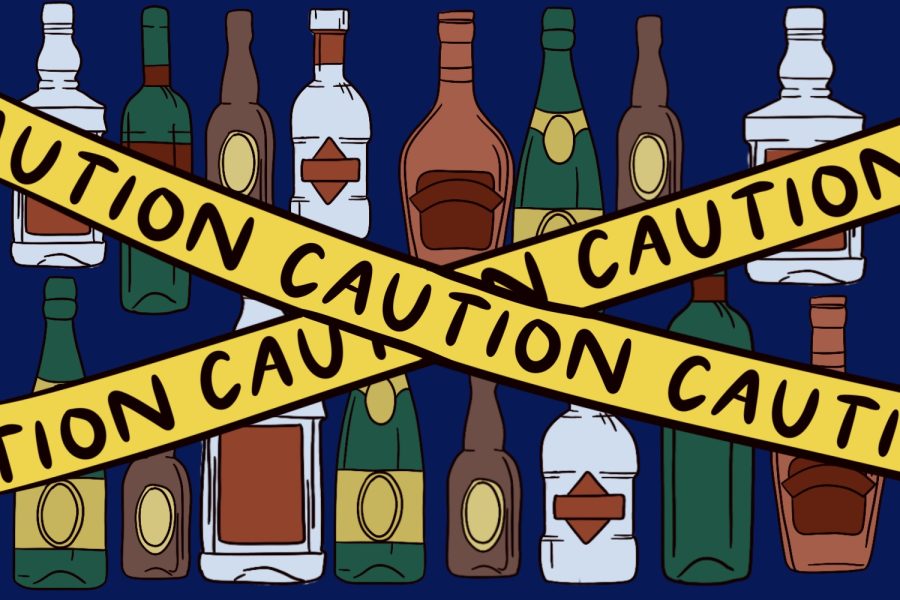Allergen labels should be required on alcohol bottles
April 27, 2023
Those who read the text on a bottle of alcohol know it looks different from the typical food or drink label. Usually, there is no list of ingredients or food allergens.
The number of people with food allergies is rapidly increasing, according to a 2015 article in the Journal of Allergy and Clinical Immunology. Millennials and Gen Z, who make up the majority of these cases, are already at or are reaching the drinking age.
Allergen labels should be required on all alcoholic beverages for the safety of the consumer.
A few generations ago, food allergies rarely existed, according to the article. Although allergies have occurred sporadically since the late 19th century, food allergy cases have rapidly increased since 1990, constituting an epidemic, according to the article.
One reason for this occurrence is that sanitation improvements have decreased the amount of germs for immune systems to attack, leading immune systems to attack harmless substances, according to an Oct. 21, 2022 Vox article.
Since food allergies are a relatively new epidemic, mainly occurring in Millennial and Gen Z generations, they often seem to be viewed as a problem faced only by children.
Today, 20 million people in the U.S. have food allergies, according to the Asthma and Allergy Foundation of America. Sixteen million of these people are adults 18 and older, most of whom can legally drink alcohol.
Most people with food allergies are old enough to legally drink alcohol, but due to the lack of allergen regulations for alcohol, they often cannot do so safely. Each time they try a new drink, they take a life-threatening risk.
Allergic reactions from food products is not a concern for many people with allergies to any of the top nine food allergens because their labeling is required by the Food and Drug Administration under the Food Allergen Labeling and Consumer Protection Act.
However, most alcoholic beverages are regulated by the Alcohol and Tobacco Products Tax and Trade Bureau, according to the Food and Drug Law Institute.
“Current regulations under the Federal Alcohol Administration Act (FAA Act) do not require the disclosure of major food allergens on alcohol beverage labels,” according to the Tax and Trade Bureau’s website.
Instead, the TTB has an optional food allergy labeling policy, in which brands may choose to label for allergens but are not required to.
I have noticed that many people do not realize how often food allergens are in drinks. Other than the more obvious amaretto or peanut butter whiskey, most people do not realize how many different drinks include nuts.
Nuts are very common in many types of alcohol, including beer, sparkling wine, liqueur, whiskey, vodka and many different types of gin, according to an Oct. 17 Erudus article.
Gluten, wheat, egg and seafood proteins are also often included in alcoholic beverages, according to Ramapo College of New Jersey.
Having tree nut and sesame allergies myself, I did not realize how many drinks contain nuts until I did my own research. I would have never known by reading an ingredient label, or even by word of mouth.
Many people with allergies often have to contact alcohol brands in advance via email or phone call to know if a hidden allergen is a risk they are facing.
Blogger Caitlyn Conville created a list of confirmed peanut- and tree nut-free alcohol based on her own research collected by contacting each brand about their allergen information.
Putting an allergen statement on a bottle is the simplest way to prevent scary, life-threatening situations from occurring. It is much easier to turn over a bottle and read for a few seconds than to scour the internet in a stressful situation.
It is necessary to increase awareness of the potential allergens in alcohol, especially for young drinkers.
Spokin, a food allergy resource filled with advice and recommendations, offers an Allergy-Friendly Cocktail Guide with tips for going to bars, drink recommendations and alcohol to avoid.
UVM should have a similar resource available to students, especially during the beginning of the semester.
Eighty percent of college students consume alcohol to some degree, according to a Sept. 21, 2022 Alcohol Rehab Guide article.
It is necessary to focus on keeping students safe while drinking, and allergy prevention is a key component of this that often goes unnoticed.
People with allergies often miss out on many experiences due to the risks that come with them. Current and future generations of adults should not have to avoid the normal social activity of drinking because government agencies fail to protect them.
